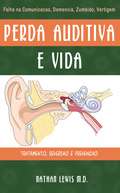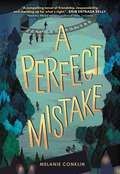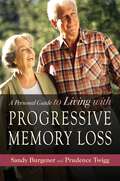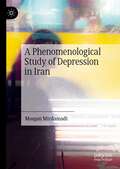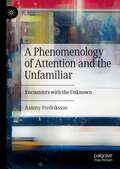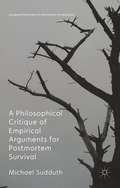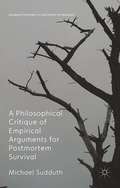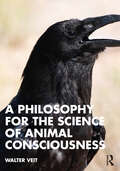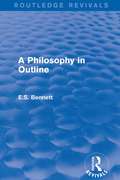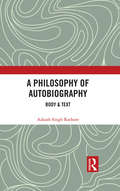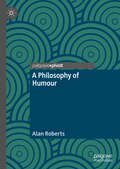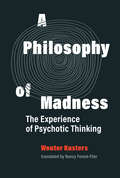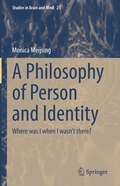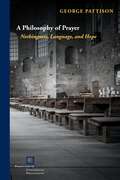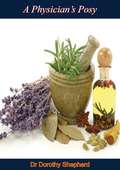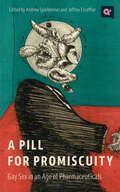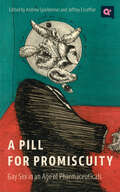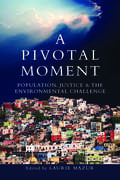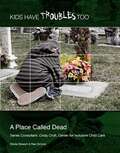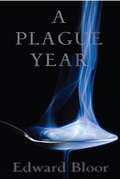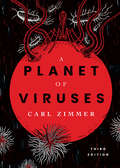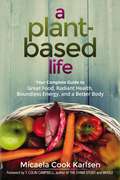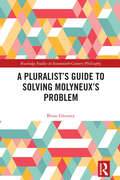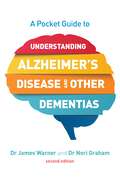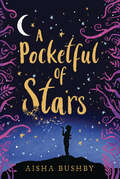- Table View
- List View
A Perda Auditva e a vida : Um guia para os pais sobre cansaço ,demencia ,tinido e vertigem
by Nathan LewisEm seu trabalho mais recente, "A perda auditiva e a Vida:um guia para os pais sobre cansaço,demencia,tinido e vertigem", voçê encontrará : •A perda auditiva e as alergias •A perda auditiva e a infecção do Sinusal •A Perda auditiva e a Articulaçao Temporomandibular •A perda auditiva em Cachorros •A perda auditiva em Bebês •A perda Auditiva é Cansativa •A relação entre perda auditiva e deficiencias •A perda auditiva em crianças pequenas •Etapas de desenvolvimento de audiçao e fala das crianças •Otite Media em crianças •tratamento de perda auditiva em crianças •Perda auditiva e zumbido no ouvido •Perda auditiva e demencia •Perda auditiva e diabetes •Como a Perda auditiva afeta a comunicaçao (cinco passos para uma comunicaçao de sucesso) •Perda auditiva devido a infecçao de dente
A Perfect Mistake
by Melanie ConklinA moving, voice-driven novel about friendship, responsibility, and fighting against unfair expectations, for fans of Rebecca Stead and Erin Entrada Kelly. Max wishes he could go back in time to before he was diagnosed with ADHD, before he grew to be the tallest kid in his class, and before he and his best friends went into the woods in the middle of the night. Max doesn&’t remember what happened after he left his friends Will and Joey and the older kids who took them there. He&’s not sure if he wants to remember. Knowing isn&’t going to make Joey talk to him again, or bring Will out of his coma. When the local authorities run out of leads, Max realizes that without his help, they may never know what really happened to Will. Charged by the idea that he may be the key to uncovering the truth, Max pairs up with classmate and aspiring journalist Sam to investigate what really happened that night. But not everyone in the community wants that night to be remembered.
A Personal Guide to Living with Progressive Memory Loss
by Prudence Twigg Sandy BurgenerMemory loss can create problems in every aspect of a person's life. The challenge of communicating thoughts and feelings can be made even harder by other people's negative perceptions of dementia. This book provides practical guidance for coping with progressive memory loss, and includes examples of real people who have faced similar challenges. These stories highlight both good and bad ways to deal with the problems that arise, and are also useful for describing the experiences of memory loss to friends and family. The authors suggest ways of maintaining physical and mental health by staying active and engaged in society. They also offer techniques for improving communication, preserving self-esteem and overcoming the stigma associated with memory loss. A Personal Guide to Living with Progressive Memory Loss offers inspiration and advice for anyone in the early stages of dementia. It also provides useful insight for family and friends who wish to offer support for a loved one affected by progressive memory loss.
A Phenomenological Study of Depression in Iran
by Moujan MirdamadiThis book is an investigation into cultural variations in experiences of depression. Examining first-person accounts of depressed persons in Iran alongside similar previously studied data from the UK, the book highlights the cultural shaping at the heart of variations in experiences, manifestations, and articulations of depression. The analyses presented appeal to some of the longstanding pillars of Iranian culture, such as folk theories and literature, as well as the dominant social influences, like the Iran-Iraq war and the Islamic revolution. A central claim made, therefore, is that contrary to the universalising approaches in psychiatry, a better understanding of the workings of mental illness is achieved by situating individuals and their experience in a meaning-making sociocultural context.
A Phenomenology of Attention and the Unfamiliar: Encounters with the Unknown
by Antony FredrikssonBuilding on the thriving discussion on the role of attention within the phenomenological tradition, from Aron Gurwitsch and Merleau-Ponty to Bernhard Waldenfels, this book investigates the enigmatic role of attention as a faculty that enables change within subjective and intersubjective experience. The aim of the book is to reveal some characteristics of the processes in which subjects are unmade and remade, and to highlight how we are able to change our relation to an empirical world that nevertheless has unity and constancy in our perception.
A Philosophical Critique of Empirical Arguments for Postmortem Survival (Palgrave Frontiers in Philosophy of Religion)
by Michael SudduthA Philosophical Critique of Empirical Arguments for Postmortem Survival.
A Philosophical Critique of Empirical Arguments for Postmortem Survival (Palgrave Frontiers in Philosophy of Religion)
by Michael SudduthSudduth provides a critical exploration of classical empirical arguments for survival arguments that purport to show that data collected from ostensibly paranormal phenomena constitute good evidence for the survival of the self after death. Utilizing the conceptual tools of formal epistemology, he argues that classical arguments are unsuccessful.
A Philosophy for the Science of Animal Consciousness
by Walter VeitThis book attempts to advance Donald Griffin's vision of the "final, crowning chapter of the Darwinian revolution" by developing a philosophy for the science of animal consciousness. It advocates a Darwinian bottom-up approach that treats consciousness as a complex, evolved, and multidimensional phenomenon in nature rather than a mysterious all-or-nothing property immune to the tools of science and restricted to a single species. The so-called emergence of a science of consciousness in the 1990s has at best been a science of human consciousness. This book aims to advance a true Darwinian science of consciousness in which its evolutionary origin, function, and phylogenetic diversity are moved from the field’s periphery to its very centre, thus enabling us to integrate consciousness into an evolutionary view of life. Accordingly, this book has two objectives: (i) to argue for the need and possibility of an evolutionary bottom-up approach that addresses the problem of consciousness in terms of the evolutionary origins of a new ecological lifestyle that made consciousness worth having and (ii) to articulate a thesis and beginnings of a theory of the place of consciousness as a complex evolved phenomenon in nature that can help us to answer the question of what it is like to be a bat, an octopus, or a crow. A Philosophy for the Science of Animal Consciousness will appeal to researchers and advanced students interested in advancing our understanding of animal minds as well as anyone with a keen interest in how we can develop a science of animal consciousness.
A Philosophy in Outline (Routledge Revivals)
by E.S. BennettFirst published in 1931, this book provides a brief overview of the essentials of philosophy. It aims to combat the notion of the inaccessibility of philosophy by providing an introduction to its history and what the author believes to a ‘minimum dose…of incontrovertible philosophical truth’. The book merely assumes an ordinary level of adult education and offers an outline of the key areas of philosophy — consciousness, reality, experience, Life, God, love, aesthetics, conduct, logic — and as such will be of interest as a very useful starting point for anyone wishing to undertake further studies.
A Philosophy of Autobiography: Body & Text
by Aakash Singh RathoreThis book offers intimate readings of a diverse range of global autobiographical literature with an emphasis on the (re)presentation of the physical body. The twelve texts discussed here include philosophical autobiography (Nietzsche), autobiographies of self-experimentation (Gandhi, Mishima, Warhol), literary autobiography (Hemingway, Das) as well as other genres of autobiography, including the graphic novel (Spiegelman, Satrapi), as also documentations of tragedy and injustice and subsequent spiritual overcoming (Ambedkar, Pawar, Angelou, Wiesel). In exploring different literary forms and orientations of the autobiographies, the work remains constantly attuned to the physical body, a focus generally absent from literary criticism and philosophy or study of leading historical personages, with the exception of patches within phenomenological philosophy and feminism. The book delves into how the authors treated here deal with the flesh through their autobiographical writing and in what way they embody the essential relationship between flesh, spirit and word. It analyses some seminal texts such as Ecce Homo, The Story of My Experiments with Truth, Waiting for a Visa, I Know Why the Caged Bird Sings, A Moveable Feast, Night, Baluta, My Story, Sun and Steel, The Philosophy of Andy Warhol, MAUS and Persepolis. Lucid, bold and authoritative, this book will be of great interest to scholars and researchers of philosophy, literature, gender studies, political philosophy, media and popular culture, social exclusion, and race and discrimination studies.
A Philosophy of Humour
by Alan RobertsHumour is a funny thing - everyone knows it but no-one knows what it is. This book addresses the question 'What is humour?' by first untangling the definitions of humour, amusement and funniness before then providing a new theory of humour which draws upon recent research in philosophy, psychology, linguistics and neuroscience. The theory is built up without assuming any prior knowledge and illustrated through humorous examples which are both entertaining and educational for anyone curious about what makes things funny. The book is then an accessible illumination of joking matters from dinner tables to online platforms to comedy clubs.
A Philosophy of Madness: The Experience of Psychotic Thinking
by Wouter KustersAn incredible publishing event: a philosopher draws on his own experience of madness as he takes readers on an unforgettble journey through the philosophy of psychosis and the psychosis of philosophy.In this book, philosopher and linguist Wouter Kusters examines the philosophy of psychosis--and the psychosis of philosophy. By analyzing the experience of psychosis in philosophical terms, Kusters not only emancipates the experience of the psychotic from medical classification, he also emancipates the philosopher from the narrowness of academia, allowing philosphers to engage in real-life praxis, philosophy in vivo. Philosophy and madness--Kusters's preferred, non-medicalized term--coexist, one mirroring the other. Drawing on his own experience of madness--two episodes of psychosis, twenty years apart--Kusters argues that psychosis presents itself to the psychotic as an inescapable truth and reality.
A Philosophy of Person and Identity: Where was I when I wasn’t there? (Studies in Brain and Mind #21)
by Monica MeijsingThis book discusses the themes of personhood and personal identity. It argues that while there is a metaphysical answer to the question of personal identity, there is no metaphysical answer to the question of what constitutes a person. The author argues against both body-mind dualism and physicalism and also against the idea that there is some metaphysically real category of persons distinct from the category of human beings or human organisms. Instead, the author presents neutral-monist, autopoietic-enactivist kind of metaphysics of the human being, and a relational, and completely human-dependent notion of a person. The tools used in these arguments include conceptual argumentation and empirical case studies. Using both personal experiences and studies of cultures all over the world, the author examines dualism between mind and body. The author discusses real people who seem to live a Cartesian life, as somehow disembodied minds as well as the concept of the person. The author uses the concluding chapters to present their own views arguing that questions about our identity should be separated from questions of our personhood as well as the concept of personhood. This volume is of interest to scholars of philosophy of mind.
A Philosophy of Prayer: Nothingness, Language, and Hope (Perspectives in Continental Philosophy)
by George PattisonExploring the silence of prayer in Post-Kantian philosophy and traditional spiritualityA Philosophy of Prayer explores prayer within the perspective of post-Kantian philosophy. Against a background of traditional sources, including Augustine, The Cloud of Unknowing, and the seventeenth-century French school of spirituality, the book uses Schleiermacher, Kierkegaard, Dostoevsky, Heidegger, Berdyaev, Tillich, Marcel, Simone Weil, Emmanuel Levinas, and Jean- Louis Chrétien to provide an interpretation of what is meant by the passivity and self-annihilation of the praying self, suggesting an “apophatics of the personality.”Pattison pays particular attention to the question of language and the implications of the role given to silence in traditional texts, arguing that language remains a defining element of the human–God relationship and that silence is not to be construed as the negation of language but as the revelation of the depth of language itself. The basic structure of prayer is shown to be implicitly eschatological, oriented toward a coming kingdom of justice and peace while, at the same time, expressing a deep desire for ontological homecoming, a tension manifest in, respectively, Levinas and Heidegger. On Pattison’s reading, prayer calls for and develops a particular orientation of the self toward existence, corresponding to the virtue of humility, long understood as the basic Christian virtue. This is shown to be in tension with modernity’s commitment to strong versions of autonomy. However, the choice of humility is not presented as the reinstatement of religious heteronomy but as a free choice of the praying self.
A Physician’s Posy
by Dr Dorothy ShepherdHere is one of the most readable and enjoyable homoeopathic books ever written. The author has chosen over twenty medicinal plants and devoted a chapter to each.Whilst doctors may possess the ability to write out prescriptions for sick persons, they may not possess that other form of ability which enables them to write readable books. It is therefore all the more refreshing to find both these abilities combined in one individual. A Physician’s Posy seems more in the nature of belles lettres than a treatise on healing the sick. In its pages the reader will encounter no pseudo-scientific jargon nor multi-syllabic words which no one can pronounce, let alone remember.Dr. Shepherd has written a fascinating history of her chosen plants and includes personal anecdotes that make her book a joy to read.
A Pill for Promiscuity: Gay Sex in an Age of Pharmaceuticals (Q+ Public)
by Andrew Holleran Jeffrey Escoffier Kane Race Andrew R. Spieldenner Steve MacIsaac Daniel Felsenthal Nicolas Flores Alex Garner Deion Hawkins Pam Dore Addison Vawters Lore Tta LeMaster Ariel Sabillon Justice Jamal Jones Jeff WeinsteinFor a generation of gay men who came of age in the 1980s and 1990s, becoming sexually active meant confronting the dangers of catching and transmitting HIV. In the 21st century, however, the development of viral suppression treatments and preventative pills such as PrEP and nPEP has massively reduced the risk of acquiring HIV. Yet some of the stigma around gay male promiscuity and bareback sex has remained, inhibiting open dialogues about sexual desire, risk, and pleasure. A Pill for Promiscuity brings together academics, artists, and activists—from different generations, countries, ethnic backgrounds, and HIV statuses—to reflect on how gay sex has changed in a post-PrEP era. Some offer personal perspectives on the value of promiscuity and the sexual communities it fosters, while others critique unequal access to PrEP and the increased role Big Pharma now plays in gay life. With a diverse group of contributors that includes novelist Andrew Holleran, trans scholar Lore/tta LeMaster, cartoonist Steve MacIsaac, and pornographic film director Mister Pam, this book asks provocative questions about how we might reimagine queer sex and sexuality in the 21st century.
A Pill for Promiscuity: Gay Sex in an Age of Pharmaceuticals (Q+ Public)
by Andrew Holleran Jeffrey Escoffier Kane Race Andrew R. Spieldenner Steve MacIsaac Daniel Felsenthal Nicolas Flores Alex Garner Deion Hawkins Pam Dore Addison Vawters Lore Tta LeMaster Ariel Sabillon Justice Jamal Jones Jeff WeinsteinFor a generation of gay men who came of age in the 1980s and 1990s, becoming sexually active meant confronting the dangers of catching and transmitting HIV. In the 21st century, however, the development of viral suppression treatments and preventative pills such as PrEP and nPEP has massively reduced the risk of acquiring HIV. Yet some of the stigma around gay male promiscuity and bareback sex has remained, inhibiting open dialogues about sexual desire, risk, and pleasure. A Pill for Promiscuity brings together academics, artists, and activists—from different generations, countries, ethnic backgrounds, and HIV statuses—to reflect on how gay sex has changed in a post-PrEP era. Some offer personal perspectives on the value of promiscuity and the sexual communities it fosters, while others critique unequal access to PrEP and the increased role Big Pharma now plays in gay life. With a diverse group of contributors that includes novelist Andrew Holleran, trans scholar Lore/tta LeMaster, cartoonist Steve MacIsaac, and pornographic film director Mister Pam, this book asks provocative questions about how we might reimagine queer sex and sexuality in the 21st century.
A Pivotal Moment: Population, Justice, and the Environmental Challenge
by Tim Wirth Laurie Ann Mazur Martha Farnsworth Riche Susan Gibbs Steve Sinding Tim CohenThrough a series of essays by leading demographers, environmentalists and reproductive health advocates, A Pivotal Moment offers a new perspective on the complex connection between population dynamics and environmental quality. It presents the latest research on the relationship between population growth and climate change, ecosystem health and other environmental issues. It surveys the new demographic landscape--in which population growth rates have fallen, but human numbers continue to increase. It looks back at the lessons learned from half a century of population policy--and forward to proposetwenty-first century population policies that are sustainable and just.A Pivotal Moment puts forth the concept of "population justice," which is inspired by reproductive justice and environmental justice movements. Population justice holds that inequality is a root cause of both rapid population growth and environmental degradation. As the authors in this volume explain, to slow population growth and build a sustainable future, women and men need access to voluntary family planning and other reproductive health services. They need education and employment opportunities, especially for women. Population justice means tackling the deep inequities--both gender and economic--that are associated with rapid population growth and unsustainable resource consumption. Where family planning is available, where couples are confident their children will survive, where girls go to school, where young men and women have economic opportunity--there couples will have healthier and smaller families.
A Place Called Dead (Kids Have Troubles Too)
by Sheila StewartDeath is scary for everyone, and not just kids. When someone you love dies, you are likely to have a whole lot of different feelings and reactions. You might not believe it's true, you might be really angry, or you might want to cry all the time. All those reactions are normal. It's never easy to deal with death, and it's not easy to know how to talk to someone else who's dealing with it. Some reactions are more helpful than others, though, and talking to someone about what you are feeling can help you better handle the situation.
A Plague Year
by Edward BloorIt's 2001 and zombies have taken over Tom's town. Meth zombies. The drug rips through Blackwater, PA, with a ferocity and a velocity that overwhelms everyone.It starts small, with petty thefts of cleaning supplies and Sudafed from the supermarket where Tom works. But by year's end there will be ruined, hollow people on every street corner. Meth will unmake the lives of friends and teachers and parents. It will fill the prisons, and the morgues.Tom's always been focused on getting out of his depressing coal mining town, on planning his escape to a college somewhere sunny and far away. But as bits of his childhood erode around him, he finds it's not so easy to let go. With the selfless heroism of the passengers on United Flight 93 that crashed nearby fresh in his mind and in his heart, Tom begins to see some reasons to stay, to see that even lost causes can be worth fighting for. Edward Bloor has created a searing portrait of a place and a family and a boy who survive a harrowing plague year, and become stronger than before.From the Hardcover edition.
A Planet of Viruses: Third Edition
by Carl Zimmer&“A captivating primer to the world of viruses that requires zero background in biology . . . a suitable first introduction to this fascinating part of our world.&” —The Inquisitive Biologist In 2020, an invisible germ—a virus—emerged and wholly upended our lives. We&’ve now become familiar with the new virus that gave us Covid-19—but viruses also cause a vast range of other diseases, including one disorder that makes people sprout branch-like growths as if they were trees. Viruses have been a part of our lives for so long that we are actually part virus: the human genome contains more DNA from viruses than our own genes. Meanwhile, scientists are discovering viruses everywhere they look: in the soil, in the ocean, even in deep caves miles underground. Fully revised and updated, with new illustrations and a new chapter about coronaviruses and the spread of Covid-19, this third edition of Carl Zimmer&’s &“information-packed, superbly readable&” A Planet of Viruses (Booklist, starred review) pulls back the veil on this hidden world. It presents the latest research on how viruses hold sway over our lives and our biosphere, how viruses helped give rise to the first life-forms, how viruses are producing new diseases, how we can harness viruses for our own ends, and how viruses will continue to control our fate as long as life endures. &“Zimmer is one of the best science writers we have today.&” —Rebecca Skloot, New York Times–bestselling author of The Immortal Life of Henrietta Lacks
A Plant-Based Life: Your Complete Guide to Great Food, Radiant Health, Boundless Energy, and a Better Body
by Micaela KarlsenMore people than ever are eating a whole-food, plant-based diet. Studies show that it is better for our bodies and better for the planet, but it isn't always easy.Whether you're taking your first steps on this path to wellness or recommitting yourself to success, author Micaela Cook Karlsen clearly maps the way. Her program enables you to set your own pace and stay the course--without relying on willpower.Drawing on personal experience and the latest research, A Plant-Based Life reveals how to:Find and sustain your motivationGradually add more whole, plant foods into your dietBreak old food addictions and establish new habitsTranslate favorite recipes to create delicious, nourishing mealsReshape your food environment (at home, at work, and on the go) to make healthy eating a no-brainerCultivate relationships that celebrate and support your new lifestyleEspecially valuable are directions for navigating roadblocks. You'll find strategies for getting family members on board and for allaying friends' concerns about your food choices with evidence-based nutrition information. Take advantage of shopping tips, pantry lists, menu plans, and more than 100 mouth watering recipes, with contributions from plant-based leaders.If your goal is a healthier, more energized life, make A Plant-Based Life your personal GPS. The journey will be more satisfying than you ever imagined.
A Pluralist’s Guide to Solving Molyneux’s Problem (Routledge Studies in Seventeenth-Century Philosophy)
by Brian GlenneyThis book presents a novel pluralist strategy for answering Molyneux’s 300+-year-old conundrum: Would a person, born blind but given sight, identify a shape previously known only by their touch? The author interweaves historical scholarship with contemporary philosophical work and empirical research on animal, infant, and adult human perception.The author argues that we need a new approach to Molyneux’s problem because we do not know what the problem is really about, and it is untestable because a Molyneux subject cannot be physically realized. He criticizes Molyneux’s question for its simplistic taxonomy of "the blind" that groups significant individual differences into a singular ontology. Research in the cognitive sciences confirms that various kinds of blindness can co-occur, such as ocular, cortical, and psychological blindness. Therefore, the author adopts an explanatory pluralism for answering Molyneux’s problem, which includes no, yes, and "no answer" answers according to the domain of inquiry being used. This account provides a research-based answer to a long-standing problem using previously unheeded insights particularly from animal crossmodal perception studies to retell a more complex story of perception: its levels of explanation and integration.A Pluralist’s Guide to Solving Molyneux’s Problem will be of interest to researchers and advanced students working in comparative psychology, epistemology, history of philosophy, philosophy of perception.
A Pocket Guide to Understanding Alzheimer's Disease and Other Dementias, Second Edition
by James Warner Nori GrahamIf you or a loved one are worried about Alzheimer's disease or other types of dementia, this pocket guide will help you to better understand the conditions, and how they are diagnosed and treated. Written by leading dementia experts, this book provides clear and concise information on: · Symptoms · Diagnosis and treatments · Getting help and support · Tips for people living with dementia · Advice for carers This is a fully-updated edition of the popular Understanding Alzheimer's Disease and Other Dementias, which featured on the Reading Well Books on Prescription for Dementia scheme.
A Pocketful of Stars
by Aisha BushbySafiya and her mother have never seen eye to eye. Her mother doesn't understand Safiya's love of gaming, and shy Safiya doesn't think she has anything in common with her vibrant, sometimes volatile mother. But when her mother falls into a coma, Safiya's whole world shifts. She finds herself dreaming about an unfamiliar setting and a rebellious girl who's distinctly familiar... As Safiya unlocks the secrets of these dreams the way she would unlock levels in a game, she realizes that opening her heart to the past is the key to changing her future—and that she may not be so different from her mother after all.
